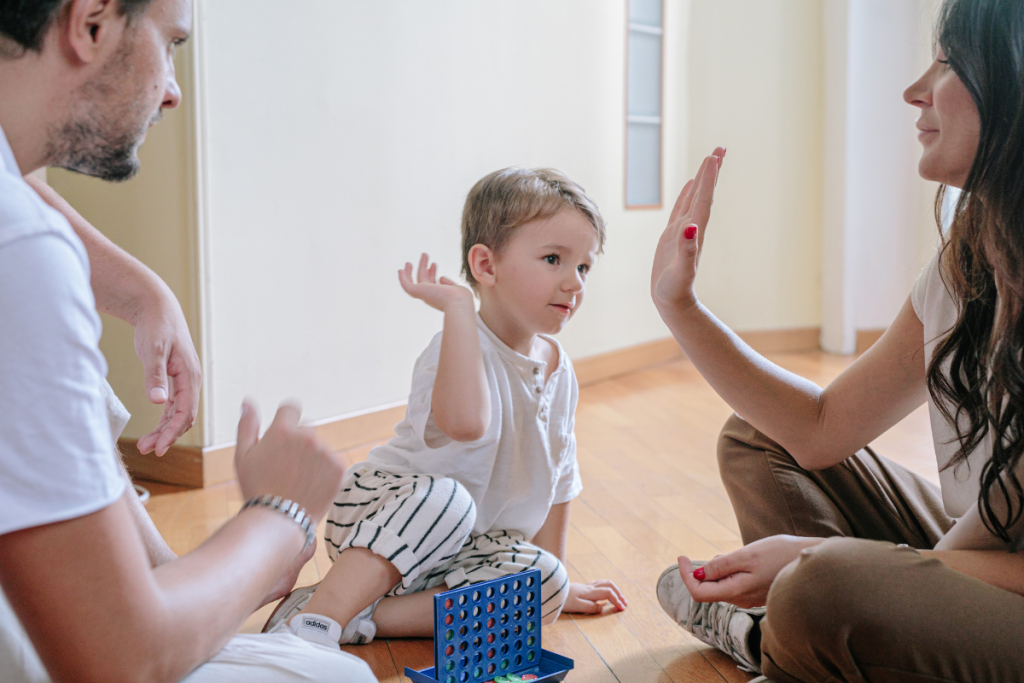In modern parenting, a revolutionary approach has emerged known as conscious parenting. This mindful parenting style, led by renowned psychologist Shefali Tsabary, has gained immense popularity for its transformative impact on parent-child relationships.
Unlike traditional parenting methods that rely on punishment and control, conscious parenting emphasizes self-awareness and mindfulness. So, what exactly is conscious parenting? It’s about being present and attuned to your child’s needs, understanding the triggers that arise within you, and consciously choosing how to respond.
Studies have shown that conscious parenting can break the cycle of intergenerational trauma, leading to healthier and more fulfilling family dynamics. Cultivating a deep connection and building a nurturing environment helps conscious parents to raise emotionally intelligent and resilient children.
Let’s explore the world of conscious parenting together and discover the profound difference it can make in your life and your child’s future.
A Peek Into The Conscious Parenting Style
Conscious parenting turns the traditional pattern of parenting on its head. Instead of dictating to children, a conscious parent is mindful, attuned, and connected with their child’s unique needs. Conscious parenting is not merely a style; it’s a philosophy helping parents to deepen their relationship with their children.
The core of this philosophy lies in awareness, a self-reflective look at our actions, reactions, and triggers from our past. In short, to be a better parent, we focus on changing ourselves, not the child.

This approach considerably differs from the gentle and positive parenting styles. Unlike gentle parenting, which primarily avoids punishment or negative reinforcement, conscious parenting transcends beyond into self-awareness. Similarly, positive parenting emphasizes reinforcement over punishment, while conscious parenting takes it a step further, urging parents to recognize and resolve their emotional trauma, thereby breaking the cycle of reaction and moving into mindful action.
By embodying these teachings, parents can transition from their traditional roles, paving the way to improved interactions, thereby influencing the child’s emotional and psychological development positively.
Key Principles Of Conscious Parenting
Embracing conscious parenting as your parenting style can bring about a transformation in your family dynamics. Let’s explore the key principles of conscious parenting that set it apart from other approaches like permissive or negative parenting:
- Letting go of ego and attachments: Conscious parenting requires an inner work that involves breaking free from your ego and expectations. As parents, acknowledging your own limitations and being open to growth helps you model healthy behavior for your children.
- Fostering mindful communication: Practicing conscious parenting means prioritizing open and authentic dialogue with your child. It’s essential to actively listen, validate your children’s emotions, and encourage them to express themselves authentically.
- Developing self-awareness in parenting: Enhanced self-awareness helps you become aware of your parenting choices and responses. This mindfulness allows you to adapt and improve your approach, ensuring it meets your child’s needs more effectively.
- Responding instead of reacting: One of the hardest but most crucial principles of conscious parenting is learning to stay calm and respond thoughtfully to your child’s behavior rather than reacting impulsively. This helps prevent conflicts and strengthen your parent-child relationship.
To fully embrace conscious parenting, seek expert guidance from parenting books and coaches. Many renowned parenting experts like Oprah and Shefali Tsabary emphasize the importance of positive parenting practices such as gentle or mindful parenting.
By committing to a conscious approach, you can be confident you’re making decisions that foster your child’s growth, emotional regulation, and overall well-being throughout their life. Additionally, cultivating a conscious parenting philosophy strengthens your bond with your child while giving them the support and healthy boundaries needed for balanced development.
Conscious parenting is not about perfection; it’s about growing and adapting together as a family. With patience, dedication, and self-reflection, you can truly make a difference in the way you raise your kids and contribute to their journey towards becoming emotionally intelligent individuals.
Stepping Into The Shoes Of A Conscious Parent
Entering into the world of conscious parenting can feel like uncharted territory. However, with the right mindset, understanding, and tools, it becomes an insightful journey of self-discovery and enhanced bonding with your child.
Here are the core values fundamental to being a conscious parent:
- Self-awareness: To begin, learning to become aware of your triggers, emotions, and behaviors is key. This vital step encourages self-reflection and personal growth while enhancing your connection with your child.
- Mindfulness: This goes beyond mere awareness to practicing presence. Conscious parenting means being fully engaged, available, and responsive to your child’s needs, living in the moment rather than being distracted or reactive.
- Understanding your Triggers: Every parent has triggers rooted in their psychology. Digging into these to comprehend where they come from allows you to process them and prevents negative parenting patterns.
- Shifting Responses: Moving from reactive to thoughtful responses is fundamental to this parenting style. It’s about pausing before reacting, allowing you to make conscious parenting choices.
As a conscious parent, you model emotional regulation, authentic spirit, and provide a nurturing environment. With these elements in place, you and your child’s growth journey becomes a collaborative endeavor, not antagonistic. With dedicated practice, conscious parenting can offer a rewarding pathway to raising emotionally intelligent, fulfilled children.
The Role Of Mindfulness In Conscious Parenting
At the heart of conscious parenting is mindfulness — a practice of being present, attentive, and responsive in each moment with your child. The power of mindfulness lies in strengthening your relationship with your child while fostering emotional intelligence and self-regulation.
Mindful Parenting Vs. Parenting on Autopilot
Parenting on autopilot can be reactive, less thoughtful, and often driven by our triggers and past experiences. Mindful parenting, on the other hand, encourages us to be more attuned to our child’s growth, experiences, and needs.
What Does It Mean to Be Mindful?
In the context of conscious parenting, to be mindful means:
- Practicing self-awareness
- Slowing down and focusing on your child’s needs
- Actively listening and validating your child’s emotions
- Acknowledging your patterned reactions and working toward change
- Cultivating empathy and understanding

Mindfulness Techniques for Parents:
- Breathing exercises: Develop a routine of taking a few deep breaths before responding to your child to bring clarity and calmness.
- Meditation: Regular meditation supports increased self-awareness, helping you notice triggers before they escalate into a reactive response.
- Journaling: Writing about your thoughts, emotions, and parenting experiences can bring valuable insights and promote self-reflection.
Applying these techniques helps you become a more mindful, attuned, and connected conscious parent, leading to stronger, healthier relationships with your children.
Reading Between The Lines: Parenting Books On Conscious Parenting
Expanding your knowledge through parenting books can open the door to a better understanding of conscious parenting. These guides provide valuable insights on strengthening your relationship with your child and instigating self-awareness.
Notable Books on Conscious Parenting include:
- “The Conscious Parent” by Dr. Shefali Tsabary: This transformative guide emphasizes examining our own behavior, pausing before reacting, and fostering an understanding of our children beyond their actions.
- “Parenting from the Inside Out” by Daniel J. Siegel: A practical guide exploring the connection between our emotional experiences and parenting methods; this book illuminates how self-understanding leads to mindful, effective parenting.
- “Everyday Blessings: The Inner Work of Mindful Parenting” by Myla & Jon Kabat-Zinn: This read delves into the essence of mindfulness in parenting, encouraging us to appreciate each moment with our children.
Key takeaways from these conscious parenting books:
- Conscious parenting creates a healthier and deeper relationship with your child.
- Our reactions often stem from unresolved past trauma; self-awareness helps in identifying these triggers.
- Parenting is not about control but guiding and understanding your child’s needs.
- Mindfulness and conscious awareness can alter habitual parenting patterns for the better.
Becoming a conscious parent requires patience, practice, and a willingness to delve deep into oneself.
The Impact Of Conscious Parenting On Child Development
Conscious parenting changes how you understand your child’s needs and growth and significantly alters your parenting style. Here’s the scoop:
Benefits of Conscious Parenting
Changing Your Reaction, Changing Their Behavior: Conscious parenting encourages parents to tackle the root of children’s behavior, teaching them to respond thoughtfully. Once you understand your triggers and model emotional regulation, you’ll also see a change in your child’s responses.
Your Approval Matters
“Are you proud of me?” The need for your approval is big in your child’s eyes. Conscious parenting believes in the power of positive reinforcement. Swap high expectations with encouragement and cheer on your mistakes as much as you celebrate victories. Your approval shapes how children learn to see themselves.
Building a Strong Bond
Raising kids isn’t easy. Everyone knows it – from parenting experts to your next-door neighbor. So, how does conscious parenting make it easier? It’s all about connection.
Positive parenting isn’t about setting strict rules. It’s about understanding feelings and needs. It’s about validating emotions and behaviors authentically. Be the kind of parent who’s there, really present.

Here are a few tips to help you make this shift:
- Be Aware: Self-reflection and inner work are key. Conscious parenting requires you to stay mindful and reflect on your own experiences and emotions.
- Stay Calm: Practicing conscious parenting demands calmness. Breathe, pause, and then respond to situations.
- Create Healthy Boundaries: Gentle parenting doesn’t mean permissive. Establish rules that respect both you and your child’s needs.
Is it easy? No. Is it worth it? Absolutely. Conscious parenting fosters a healthier, stronger parent-child relationship and helps raise emotionally intelligent kids. So, give it a try and see the difference yourself!
Tips For Adopting Conscious Parenting Techniques
Taking conscious parenting to heart can be transformative, so here are some straightforward tips to set you on the right path:
- Practice Self-Care and Self-Reflection: Conscious parenting starts with self-awareness. Take time for self-care and self-reflection to understand your behaviors, impulses, and emotional triggers. This inner work fuels mindful parenting.
- Listen Actively and Validate Your Child’s Feelings: When your child opens up about their feelings, listen with your full attention. Make them feel heard. Validate their feelings and show empathy. This fosters a safe emotional environment.
- Set Boundaries with Love and Understanding: Rather than setting strict rules, establish healthy boundaries based on respect and understanding. This empowers your kids and reinforces positive behavior.
- Be Patient and Embrace Growth: Patience is an essential attribute in conscious parenting. Understand that every child’s journey is different and be patient with their progress. Embrace growth – both yours and your child’s.
- Learn to Respond, Not React: Stay calm and calculated in heated situations. Instead of reacting impulsively, respond mindfully to your child’s behavior. Consider what’s beneath the surface of their behavior and help them address those underlying issues.
Becoming a more mindful and aware parent doesn’t happen overnight. It’s a journey rather than a destination. Persevere and continue striving to give your child the most empathetic, understanding, and conscious form of care you can offer. Because practicing conscious parenting requires commitment, but the payoff – raising emotionally intelligent children in a questioning, compassionate world – is truly invaluable.
The Difference Conscious Parenting Makes
Think about it – how has your parenting style shaped your relationship with your child today? With conscious parenting, things could look a lot different.
This mindful way of parenting encourages self-awareness, helping you recognize triggers tied to your own past trauma. It’s not about punishment – but about understanding. Reacting to your child’s behavior without self-reflection only promotes recurring issues.
But when you understand your triggers, as a conscious parent, you respond rather than react. You embrace mindfulness and cause a positive shift in your child’s behavior.
The result? A healthier, more secure, and more loving bond. The lasting effects of conscious parenting shape not just your relationship with your child but also your child’s future relationships.
So reflect and care for those triggers. Strive to be a conscious parent – it truly makes a difference.

Leave a Reply